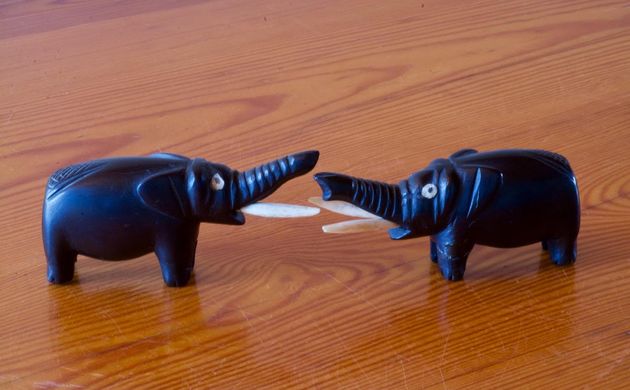The Bible only mentions ebony once, in the book of Ezekiel.
 The black colour of ebony wood was combined with the white colour of ivory to make ornamental figures, like these African elephants. / Antonio Cruz
The black colour of ebony wood was combined with the white colour of ivory to make ornamental figures, like these African elephants. / Antonio Cruz
“The men of Rhodes traded with you, and many coastlands were your customers; they paid you with ivory tusks and ebony”. (Ezekiel 27 v 15)
Black ebony Wood (Diospyros ebenum), hobní in Hebrew and also hbny in Egypt. The literal meaning of these terms is “stone” or “wood stone”, on account of its extraordinary harness.
The generic name “Diospyros” comes from a Greek word which etymologically means “the grain or fruit of God”. There are many species of ebony tree, both in Asia and in Africa, although not all of them have such uniformly dark wood.
In ancient times, the merchant ships of Tyre imported ebony and ivory from the coasts of the Indian Ocean, as the Phoenicians traded with products of this kind.
The dark colour of ebony, as well as its density and the fact that it was so easy to polish, made it easy to combine with white ivory, so it was highly appreciated in marquetry and ornamentation.
Ebony trees belong to the Ebenaceae family, usually reach a height of between 20 and 30 metres, have a broad crown and a thick trunk. Thee trunk has a light-coloured bark (sapwood) surrounding the black heartwood, which is the highly appreciated ebony wood.
It has been used to make knife-handles, brushes and tools, musical instruments such as clarinets, chess-figures, black piano-keys, animal-figures and so on. From the 13th century onwards until the Baroque period, ebony was used in Europe to make luxury objects like furniture with a black veneer (hence the Spanish term ebanistería, “cabinet-making” in English) and exotic desks. However, the mahogany trade, in the 18th century, led to ebony gradually being abandoned.
The leaves of authentic ebony trees are lanceolate, dark green in colour and are arranged alternately on the stems. The flowers are also usually green, and the fruit takes the form of round, yellowish berries.
However, there is actually a range of different species which are sometimes grouped together under the same common name.
For example, so so-called Bombay or Ceylon ebony includes the species D. bupru, D. ebenaster, D. ebenum, D. melanoxylon, D. peregrina, D. silvatica, etc; the name “Manila ebony”, is given to the species D. ebenaster, D. philippensis y D. nigra.
But there is also “Philippines ebony”, “green India ebony”, “white ebony”, “Gabon ebony”, “Madagascar ebony”, “red Mauritius ebony”, etc., each with their respective associated species, which gives some idea of the enormous diversity of ebony trees and ebony wood that exists.
The Bible only mentions ebony once, in the book of Ezekiel, namely the verse that appears at the top of this article (Ezekiel 27 v 15), in relation to the prosperous maritime trade and the splendour of the port-city of Tyre.
This chapter refers to the fact that, despite the grandeur and luxury of this city, its inhabitants were utterly indifferent to the most basic moral principles. All that really mattered to them was trade and the material wealth that it brought them, even though they achieved this wealth by means of morally unscrupulous conduct.
They saw themselves as gods, believing that they depended on themselves alone to achieve wealth and well-being. They forgot God completely, and the consequences were catastrophic.
The city of Tyre was erased from the face of the earth. The lesson couldn’t be clearer: every society that turns its back on Almighty God and consciously sets its face against His will, whatever the material prosperity it might be experiencing, will come to nothing. Sooner or later it will disappear.
Today there are many people who do not believe in God, but He is still in control of the history of the world, and in the end, He will pronounce judgement on it.

Las opiniones vertidas por nuestros colaboradores se realizan a nivel personal, pudiendo coincidir o no con la postura de la dirección de Protestante Digital.
Si quieres comentar o